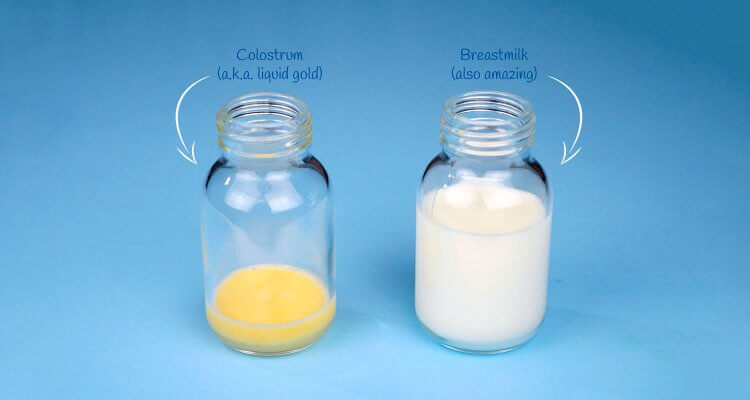We often hear new mothers expressing concern when they start breastfeeding their newborn right after birth. “I’m not producing any milk” or “I have very low supply” are things that are often said when initially trying to establish a healthy breastfeeding relationship. Breastfeeding can be difficult, and it can cause a lot of stress for new mothers. More often than not, these mothers are providing everything their baby needs and may not be aware of it.
Colostrum: Liquid Gold
New mothers produce colostrum within minutes of giving birth (and often even during the last few weeks of pregnancy). Colostrum is “pre-milk” and has different substances, nutritional value, and color than “mature breast milk”. It has all of the nutrients a newborn will need for the first few days including protective factors against infections. Even after a cesarean section colostrum production has been in full force for weeks already!

Photo credit: mamanatural.com
How much should baby be eating?
Let’s cut to the chase: newborns need very little to eat. Their stomachs are very small to start with and grow as they get bigger and start to eat more. New mothers produce approximately 1-4 teaspoons of colostrum per day. Moms that start pumping in the first few days may be worried they aren’t producing much, which is understandable if they are producing only a couple of teaspoons a day! Don’t let that pump deceive you — you’re producing exactly what your little one needs.
Some Benefits of Colostrum
- Complete nutrition for newborn needs
- Helps protect against jaundice
- Easy to digest on the newborn system
- Immune system support
- Helps pass the first stool (meconium)
- So much more – It is liquid gold after all!
When does milk come in?
Colostrum lasts for the first few days (2-5 or so), becomes transitional milk (colostrum+milk), then full mature milk. It takes 1-2 weeks before a new mother will feel that she is starting to produce milk. Even once this happens, it may take longer still before she feels that she is producing “enough”. Remember, the newborn’s stomach is slowly expanding, so as its demands increase the mother’s supply will increase as well. Breastfeeding is a supply and demand system, so keep baby close to you with lots of skin-to-skin time and breastfeed often and on-demand!
Learning to nurse can sometimes be a difficult thing for a newborn, as well as the newborn’s mother! Stick with it, and remember that the newborn doesn’t need a lot initially.
Chiropractic care can also help with making sure the newborn’s nervous system is free and clear of interference so that they can learn to nurse effectively! Schedule a complimentary consultation here.
